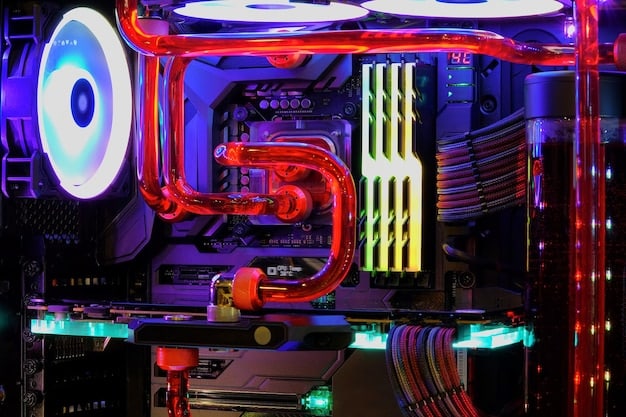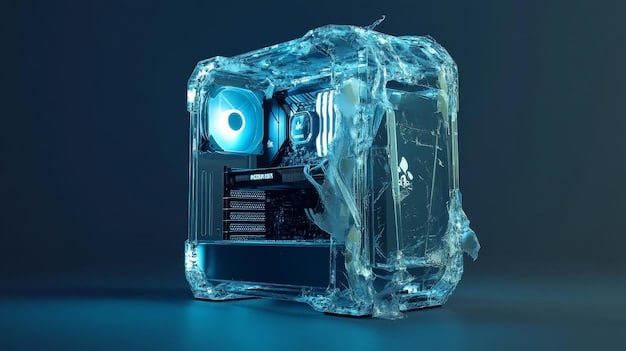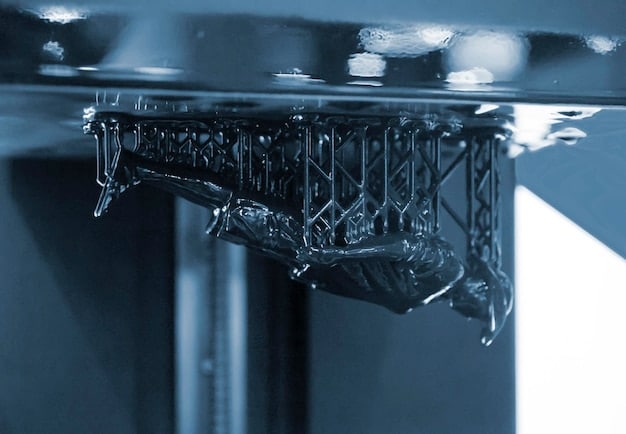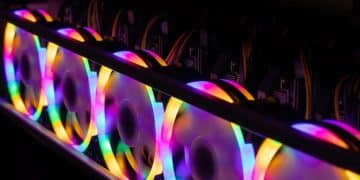Is Liquid Cooling Worth It? Data Analysis for Gaming PCs

Is Liquid Cooling Worth It? A Data-Driven Analysis for High-End Gaming PCs reveals that while liquid cooling offers superior temperature control and quieter operation, its cost and complexity may not always justify the performance gains for every gamer.
Are you building a high-end gaming PC and wondering if liquid cooling is the right choice? The allure of lower temperatures and quieter performance is strong, but the cost and complexity can be daunting. Is Liquid Cooling Worth It? A Data-Driven Analysis for High-End Gaming PCs aims to provide a clear, unbiased answer.
This analysis dives deep into the performance benefits, cost considerations, and potential drawbacks of liquid cooling, empowering you to make an informed decision for your next gaming rig. Let’s explore whether liquid cooling is truly worth the investment for your specific needs.
Understanding Liquid Cooling Systems
Liquid cooling systems have become increasingly popular among PC enthusiasts, offering an alternative to traditional air coolers. They work by circulating a coolant fluid through water blocks attached to heat-generating components, such as the CPU and GPU. This process efficiently transfers heat away from these components, maintaining lower temperatures and potentially enabling higher performance.
Types of Liquid Cooling Systems
There are two main types of liquid cooling systems: all-in-one (AIO) coolers and custom loop systems. AIO coolers are pre-assembled, closed-loop systems that are easy to install and require minimal maintenance. Custom loop systems, on the other hand, offer greater flexibility and customization options, but they also demand more technical expertise and ongoing maintenance.
- All-in-One (AIO) Coolers: These are self-contained units that are easy to install and require no maintenance. They are a great option for users who want the benefits of liquid cooling without the complexity of a custom loop.
- Custom Loop Systems: These systems allow for complete customization, including the choice of components, tubing, and coolant. They offer superior cooling performance and aesthetics but require more effort and expertise to set up and maintain.
- Open Loop Systems: Offer ultimate flexibility in component selection but demand extensive maintenance and expertise.

Ultimately, understanding the different types of liquid cooling systems is crucial for determining whether Is Liquid Cooling Worth It? A Data-Driven Analysis for High-End Gaming PCs, as each type offers a unique balance of performance, cost, and complexity.
Performance Advantages of Liquid Cooling
One of the primary reasons gamers consider liquid cooling is its potential to deliver superior cooling performance compared to air coolers. Lower temperatures can translate to higher clock speeds, reduced thermal throttling, and increased overall system stability. These advantages can be particularly significant for high-end gaming PCs that push components to their limits.
Temperature Reduction
Liquid cooling systems are generally more effective at dissipating heat than air coolers, resulting in lower operating temperatures for the CPU and GPU. This can lead to improved performance and longevity of these critical components.
Overclocking Potential
Lower temperatures enable greater overclocking headroom, allowing gamers to push their hardware beyond its stock settings for increased performance. Liquid cooling helps maintain stable temperatures even under heavy overclocking loads.
- Sustained Performance: Liquid cooling helps maintain higher clock speeds for longer durations, preventing thermal throttling and ensuring consistent performance during demanding gaming sessions.
- Reduced Fan Noise: Liquid coolers can operate at lower fan speeds than air coolers while maintaining the same temperatures, resulting in a quieter gaming experience.
- Extended Component Lifespan: By keeping temperatures lower, liquid cooling can potentially extend the lifespan of the CPU and GPU, protecting your investment.
The performance advantages of liquid cooling are undeniable, but it’s important to weigh these benefits against the cost and complexity to determine whether Is Liquid Cooling Worth It? A Data-Driven Analysis for High-End Gaming PCs for your specific gaming setup.
Cost Considerations
While the performance benefits of liquid cooling are appealing, the cost is a significant factor to consider. Liquid cooling systems, especially custom loop setups, can be considerably more expensive than air coolers. The initial investment, along with ongoing maintenance costs, can add up over time.
Initial Investment
AIO coolers typically range from $80 to $200, while custom loop systems can easily cost $300 or more, depending on the components and complexity. This initial investment can be a barrier for budget-conscious gamers.
Maintenance Costs
Custom loop systems require regular maintenance, including flushing the coolant and cleaning the water blocks, which can incur additional costs for coolant, cleaning supplies, and potentially replacement parts. AIO coolers generally require less maintenance, but they may need to be replaced after a few years.
The cost considerations play a crucial role in determining whether Is Liquid Cooling Worth It? A Data-Driven Analysis for High-End Gaming PCs. When weighing the costs, consider:
- Budget Constraints: Assess your budget and determine how much you’re willing to spend on cooling.
- Long-Term Costs: Factor in maintenance costs, potential replacement costs, and the overall lifespan of the cooling system.
- Alternative Options: Compare the cost of liquid cooling with alternative cooling solutions, such as high-end air coolers.
Installation and Complexity of is Liquid Cooling Worth It? A Data-Driven Analysis for High-End Gaming PCs
Beyond the financial investment, the installation and complexity of liquid cooling systems can also be a deterrent for some gamers. While AIO coolers are relatively easy to install, custom loop systems require more technical expertise and can be time-consuming to set up.
AIO Cooler Installation
AIO coolers are designed for easy installation, typically involving mounting the water block to the CPU and attaching the radiator to the case. The process is similar to installing an air cooler, and most AIO coolers come with clear instructions and mounting hardware.
Custom Loop Setup
Custom loop systems require more planning, expertise, and time to set up. This includes selecting compatible components, cutting and bending tubing, installing water blocks, filling the loop with coolant, and leak testing the system.
Before diving into liquid cooling, it’s wise to be aware of potential pitfalls:
- Compatibility Issues: Ensuring that all components are compatible with each other and fit within the case.
- Leak Potential: Custom loops can leak if not assembled and maintained properly, potentially damaging expensive components.
- Maintenance Requirements: Custom loops require regular maintenance, including flushing the coolant and cleaning the water blocks, to prevent corrosion and maintain optimal performance.

Alternatives to Liquid Cooling
For gamers who are hesitant about the cost and complexity of liquid cooling, there are several alternative cooling solutions that can provide excellent performance. High-end air coolers, in particular, have made significant strides in recent years and can often rival the performance of AIO coolers at a lower cost.
High-End Air Coolers
Modern air coolers feature large heatsinks, multiple heat pipes, and powerful fans, enabling them to effectively dissipate heat from the CPU and GPU. These coolers are typically more affordable than liquid cooling systems and easier to install.
Optimized Case Airflow
Proper case airflow is crucial for effective cooling, regardless of whether you’re using an air cooler or a liquid cooler. This involves strategically placing intake and exhaust fans to create a consistent flow of cool air through the case.
When thinking about cooling options, keep these points in mind
- Performance Expectations: Assess your performance requirements and determine whether an air cooler can meet your needs.
- Noise Levels: Consider the noise levels of different cooling solutions and choose one that provides a balance of performance and quiet operation.
- Ease of Installation: Evaluate the ease of installation of different cooling solutions and choose one that matches your technical skills and comfort level.
| Key Aspect | Brief Description |
|---|---|
| 🌡️ Temperature | Liquid cooling generally offers lower temperatures than air cooling. |
| 💸 Cost | Liquid cooling, especially custom loops, can be significantly more expensive. |
| 🛠️ Installation | AIO coolers are easier to install, while custom loops require more expertise. |
| 🤫 Noise | Liquid cooling can often operate more quietly, especially under load. |
Frequently Asked Questions
The primary benefits include superior temperature management, which can lead to higher clock speeds and quieter operation. Additionally, it enhances the aesthetic appeal of your gaming rig.
AIO coolers generally require minimal maintenance, while custom loops need maintenance every 6-12 months. This involves flushing the coolant and cleaning components to prevent build-up and corrosion.
Yes, liquid cooling provides better thermal headroom, allowing you to push your CPU to higher clock speeds while maintaining stable temperatures. This is because Is Liquid Cooling Worth It? A Data-Driven Analysis for High-End Gaming PCs helps dissipate heat more effectively.
When installed and maintained properly, liquid cooling is perfectly safe. Leaks can be a risk, especially in custom loops, but careful assembly and regular checks can minimize this.
Yes, high-end air coolers can provide excellent performance, often rivaling AIO coolers. Improved case airflow and efficient thermal paste application are also effective alternatives to consider. The core question of Is Liquid Cooling Worth It? A Data-Driven Analysis for High-End Gaming PCs depends on these factors.
Conclusion
Ultimately, determining whether Is Liquid Cooling Worth It? A Data-Driven Analysis for High-End Gaming PCs depends on your individual needs, budget, and technical expertise. While liquid cooling offers undeniable performance benefits, the cost and complexity may not be justified for all gamers.
Carefully weigh the advantages and disadvantages, consider alternative cooling solutions, and make an informed decision that aligns with your goals. By doing so, you can build a high-end gaming PC that delivers optimal performance and reliability.





